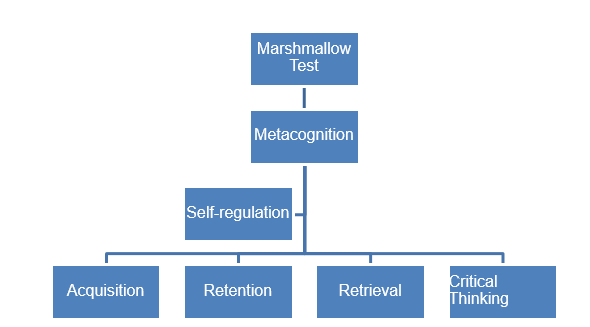The Marshmallow test was first held in the 1960s and the researchers focused on delayed gratification and the ability of children to wait. Children are invited into the room with a chair and a table with no other distractions (“The Marshmallow Test”). One marshmallow is placed right in front of children and they are told that they can get another one if they wait. Many children are trying to wait to get another treat while others eat the marshmallow almost at once. It is clear that the older a child is the more patient he/she is.
This test tells a lot about metacognition and self-regulation. Metacognition can be defined as people’s knowledge and experience in learning. In other words, metacognition is what people know about their ability to learn. Thus, metacognition is also people ability to effectively control acquisition, retention and retrieval of information (Bjork, Dunlosky and Kornell 422). Metacognition is closely connected with self-regulation, as people need to take control over their thinking processes to succeed in this or that situation.
The test shows that children who have certain experience in learning and have developed effective metacognition are able to control themselves and wait. Thus, children who succeed choose to distract themselves from the temptation. They do impressions, close their eyes, look at the door. They control their thinking processes as they prevent themselves from thinking about marshmallow as a delicious treat.
As has been mentioned above, age is an important determinant and older children are more successful. This also supports the assumption that older children develop effective metacognition during their studies. At school, they have to complete various tasks and they learn about the most effective strategies they can apply in different situations. These effective strategies are utilised during the test.

The Marshmallow test reveals peculiarities and significance of metacognition. It is clear that self-regulation is central to effective metacognition development. Children who can take control over their behaviour and thinking can learn better and be more successful when completing tasks. Researchers stress that metacognition consists of acquisition of information, its retention and retrieval as well as the ability to think critically. Critical thinking is crucial when choosing the right learning strategy.
The test shows that children who are able to understand that distraction is the key to their success and have enough capacity to control their thinking succeed. Thus, children control their thinking and distract themselves. They do not have other distractions and they have to make them up in their head. The boy who gets another marshmallow uses different strategies to remain distracted (“The Marshmallow Test”). It is also clear that younger children do not have self-control and they have not developed metacognition yet. Therefore, they simply eat the treat without waiting, as they cannot control their thinking and do not have enough experience in critical thinking.
Older children have gained certain experience and they know what can keep them distracted or what is needed to leave the treat alone. It is clear that children managed to gain their experience through the use of the three major steps: acquisition, retention and retrieval. Therefore, it is possible to conclude that researchers’ claims concerning the importance of metacognition are valid. It is not enough to give the child certain amount of information, it is much more important to equip him/her with the necessary learning strategies so that the child could effectively learn in future.
Works Cited
Bjork, Robert A., John Dunlosky and Nate Kornell. “Self-Regulated Learning: Beliefs, Techniques, and Illusions.” Annual Review of Psychology. 64 (2013): 417-444. Web.
The Marshmallow Test. Web.